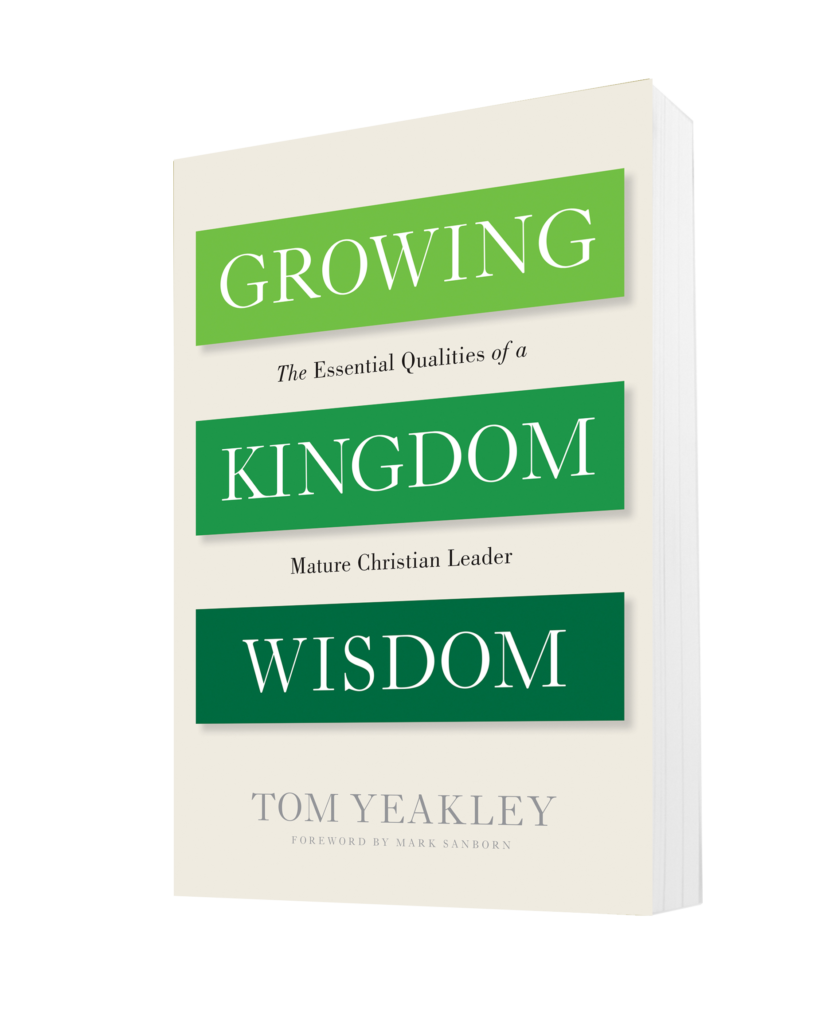All power and authority find their source in the relational dynamic of leader and follower. Note what the devil offers Jesus in the second desert temptation: “The devil led him up to a high place and showed him in an instant all the kingdoms of the world. And he said to him, “I will give you all their authority and splendor; it has been given to me, and I can give it to anyone I want to” (Luke 4:5-7). Jesus would have to first acknowledge the devil’s leadership, then be given worldly power. Jesus did not refute the devil’s ability to give it. The devil has authority, but it is limited under the ultimate authority of Christ who has “all authority in heaven and on earth” (Matthew 28:18).
This post is from the NavPress book, Growing Kingdom Wisdom by Tom Yeakley, who has been serving in leadership roles at the national level for The Navigators for many years. Tom’s heart is to mentor young leaders with godly wisdom.
Please consider purchasing Growing Kingdom Wisdom. on navpress.com Code: WISDOMGOGO during 8/31/19 – 9/10/19. For each book purchased, the Navigator 20s ministry will receive a copy to mentor a young leader. We are grateful for your partnership with The Navigators.
Contrasted with worldly power founded on a leader-follower relationship is the power that comes from the Lord—an anointing of His Spirit that is given to accomplish His purposes in and through us. Through the blood of Christ and because of His atonement, believers now have power over sin, demons, and our ultimate enemy, death. God’s servant leaders are given authority to lead and influence others and are called to steward that influence well. Spiritual leaders will all give an account to Him of how they use this authority and influence (see Hebrews 13:17).
Kingdom Leaders are Under the Authority of God
With positional leadership comes a certain amount of authority to set direction, distribute resources, and solve missional challenges. It is a privilege and a sobering responsibility to have positional authority. But positional authority is limited by one’s rank or title. Kingdom leaders do not have carte blanche to rule by fiat! They, too, are leaders under authority.
If you polled emerging leaders from the Millennial generation and ask them how they perceive the subject of authority, their response is overwhelmingly negative. In fact, in a recent meeting, one young person said, “I’m trying to learn how to lead without using authority.” Well, good luck with that one!

This person’s intent was to use authority in an unoppressive or unharmful way. In that person’s experience, all those in authority had either greatly disappointed or taken advantage of them. Parents had divorced each other, trusted family members had abused them, and teachers or religious leaders had used their position for their own ends. In this case, it is understandable why power and authority are viewed with such a negative perspective.
Leading by Personal Authority
But there is a second type of authority and power that has far greater ability to influence people—personal authority. For Kingdom leaders, personal authority is built as trust grows between the leader and those being led. It arises from the leader’s growing intimacy with God. That relationship is recognized by others, and they willingly give the leader power to influence them, trusting that God is speaking to and guiding the leader. This voluntary submission to another’s influence allows a leader to speak to heart issues, character issues, and areas that are outside of the mission or task. A wise leader will not assume this authority but will always ask permission to speak into these areas before addressing them.
Leaders can grow in their ability to influence others as they gain more experience. You’ve seen this before and know what to expect, and therefore your confidence regarding how to handle this situation breeds confidence in others.
Power and Competency
Power and influence can be gained through increased competency. A trained, skilled leader will find that others willingly follow them because they believe they are being led by someone who knows what to do. For Kingdom leaders, in addition to growing in leadership skills, a growing competency in applying the Bible to life and leadership adds to their personal authority (see 2 Timothy 2:15).

We must also acknowledge that certain personalities seem to influence others more naturally. Those who are more extroverted in their personality type, more people oriented, would have more of a penchant for influencing the tone and culture of a larger group. This natural ability to influence is enhanced through spiritual gifting and the Spirit’s empowerment. But does God only use extroverts to lead on a larger scale? While introverts can be good at gaining trust and building loyalty with individuals, can God use introverts to lead broadly? After all, they are 50 percent of the human race!
More Power
Some years ago, I read a biography of D. L. Moody. The book related an incident in Moody’s life where he did not sense God’s power when he preached. He desired to see God use him in greater ways to influence people through his public ministry of the Word. Moody began to pray for greater power when he preached God’s Word. He asked God for a special anointing to move the hearts of people as he proclaimed the gospel to the lost. God answered Moody’s prayer, resulting in a much greater response to his public ministry.[i]
As I’ve followed Moody’s example, that passage has become a personal promise for my own public ministry of God’s Word. Because my God-given temperament is more of an introvert, I find comfort in people like Saul, who were hesitant to assume the role of leader. Saul was probably introverted (or at least shy); he was hiding when the selection council met at Mizpah to choose their first king (1 Samuel 10:17-24).
I began to pray over 1 Samuel 10:6 regularly before I spoke, saying something like this:
Lord, just as you promised through Samuel to Saul that your Spirit would enable him to proclaim your truth with power and change him into a different person, I’m asking that you do that for me. May these people hear you speaking through me as you make me into your spokesman. May my words be empowered by you to touch their hearts as well as their heads. And may lasting change come about because of this speaking opportunity.
This prayer pattern has become my habit every time I have the privilege to stand before people and share His Word. And I, too, sense, like Moody, that it has truly made a difference in my public ministry.
Wise leaders know that they exercise power and that this power can build up or tear down. It can be used for blessing or damaging others. And they are aware that they will one day be held accountable to God for the use of their leadership power. Thus, they are circumspect in its use and loving in its exercise.
Apply to Your Leadership
Read the following passages independently or with a group. Observe the wise use of power and apply to your life and leadership.
- Zechariah 4:6
- Psalm 62:11-12
- Matthew 28:19-20
- Luke 4:1, 14
- Galatians 2:20
- Philippians 4:13
- 1 Corinthians 4:1-7
- 1 Corinthians 4:14-21
- Ephesians 4:29, 32
- Ephesians 5:15-20
- Ephesians 6:10
Temptations of Jesus
Review the three temptations of Jesus in Luke 4:1-15. Note how the devil sought to tempt Jesus in the abuse of His power and how unwise leaders are tempted in the same way today.
Rehoboam vs. Jeroboam
Read 1 Kings 12:1-19 regarding the leadership of Rehoboam. Note how he used his positional leadership authority and power. Contrast that with the wisdom of Jeroboam. How are unwise leaders tempted to do similar things today?

You have just read an excerpt from Growing Kingdom Wisdom: The Essential Qualities of a Mature Christian Leader by Tom Yeakley.
Tom Yeakley left a successful career in veterinary medicine to work in collegiate ministry. He and his wife, Dana, spent ten years mentoring ministry leaders in Indonesia before returning to the United States, where they both have been in leadership roles at the national level for The Navigators ever since. Tom is the author of multiple books including Growing Kingdom Wisdom, Growing Kingdom Character, and Praying over God’s Promises.
[i] See William R. Moody, The Life of Dwight L. Moody (Murfreesboro, TN: Sword of the Lord, 1900) and Dwight Lyman Moody, Secret Power: or the Success in Christian Life and Christian Work (New York: Revell, 1881).

